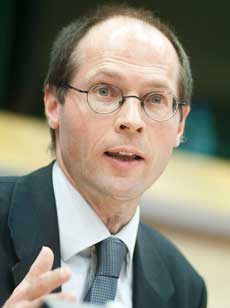
The right to food
1. An overview
In this talk, Olivier De Schutter explains how the right to food came about, what it means and the kind of framework laws that can help give it effect. He discusses governments' obligations to respect, protect and fulfill the right to food, the major transitions needed to create sustainable food systems, the obstacles to be overcome, and the bottom-up activities in support of these changes.
Please respond to a 60 sec survey after watching - Click here to take survey
The running order for the video is as follows:
Introduction. 0 - 2 minutes 18 seconds
Part 1. What is the right to food?: 2 min 18 sec - 10 min 42 sec
Part 2. Framework laws: 10 min 42 sec - 15 min 53 sec
Part 3. Transitions towards sustainable food systems: 15 min 53 sec - 22 min 26 sec -
Part 4. Overcoming lock-ins: 22 min 26 sec - 25 min 35 sec
Part 5. Change from the bottom up: 25 min 35 sec - end
Further reading
You can find all Olivier De Schutter's reports as UN Rapporteur on the right to food here and his final report, "The transformative potential of the right to food", here
Committee on Economic, Social and Cultural Rights, General Comment No. 12: The Right to Adequate Food (art. 11). (1999), available here
FAO (2005) VOLUNTARY GUIDELINES to support the progressive realization of the right to adequate food in the context of national food security, available here
Links
UN, Office of the High Commissioner for Human Rights, Special Rapporteur on the right to food
FIAN is an international human rights organization that has advocated for the realization of the right to adequate food for more than 25 years.The right to food campaign, India has much more information on the activities in India mentioned in the talk
The UN Food and Agriculture Organisation (FAO) has a site devoted to the right to food here
About

Olivier De Schutter completed his 6-year mandate as the UN Special Rapporteur on the right to food in May 2014.
He teaches international human rights law, European Union law and legal theory at the Université catholique de Louvain in Belgium, as well as at the College of Europe. He is also a visiting professor at Columbia University. Additionally, he was a visiting scholar (2010-2012) at American University Washington College of Law's Academy on Human Rights and Humanitarian Law.
In 2013, Olivier De Schutter was awarded the prestigious Francqui Prize, in recognition of his contributions to the theory of governance, EU law, and international and European human rights law. He organised the The Francqui International Conference in May 2015 on the theme The EU’s Fifth Project (EU5P): Transitional Governance in the Service of Sustainable Societies.
He is co-chair, together with Dr Olivia Yambi, of an International Panel of Experts on Sustainable Food Systems (IPES-Food) set up by the The Daniel and Nina Carasso Foundation in 2014 and will join the UN Committee on Economic, Social and Cultural Rights in 2015.
Usage
This video is a public good, open education resource that is unrestricted in non-commercial use (for commercial purposes or in commercial organisations permission is needed). If in doubt please contact Geoff Tansey. Please respond to the survey as this feedback will help in taking this 'virtual academy' work further. Suggestions for further materials to be linked to this page or added to this series are also welcome. Olivier De Schutter is currently not available for follow-up via the internet.